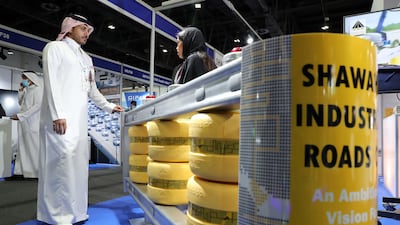The UAE rail project that will include city-to-city passenger services could be the first step towards a GCC-wide network, a leading transport expert has said.
Aaditya Thakrar, strategic transport planning manager for engineering firm Aecom, said the passenger service was a major breakthrough that would transform the region.
The project could lead to benefits such as reducing levels of traffic congestion and improving road safety, as well as making the region a more desirable place to work and study, he said.
Mr Thakrar spoke on the sidelines of the opening day of the Gulf Traffic conference at Dubai’s World Trade Centre.
A Gulf-wide freight and passenger train network has been mooted for years but has yet to come to fruition. Experts recently told The National that the push for lower emission transport and joint infrastructure projects could change that.
“This is a great initiative that could follow on to become a GCC-wide network,” Mr Thakrar said.
Aecom
“It’s an impressive starting point and it will tie into the existing system and will encourage people to get out of their cars and take other forms of transport.”
UAE leaders revealed on Sunday night that the country’s rail system would be expanded to include passenger services across the country.
Etihad Rail’s network will grow from transporting heavy goods to carrying millions of passengers between UAE cities, the government said.
People will be able to travel from Abu Dhabi to Dubai in 50 minutes, and to Fujairah from Abu Dhabi in 100 minutes by 2030.
A statement from the government said the project was worth Dh200 billion ($54.45bn) to the economy but the benefits were far more than merely financial, Mr Thakrar said.
“This will obviously have a beneficial impact on road safety as there will be far less private vehicles being used,” he said.
“A major cause of traffic accidents right now is driver behaviour but, with technological advances, there are smarter systems being invented.
“If you combine that with less traffic, it’s definitely going to have a significant effect for the better.”
The announcement of a passenger service also sends a strong message both regionally and globally, said Mr Thakrar.
“Typically this region is seen as being strong in fossil fuel and energy but this shows we are also focused on mass mobility and sustainability,” he said.
“It’s not simply a case of business as usual."
Residents and commuters will be among the big winners of a new passenger train service, he said.
“It’s great to think you can sit back and relax on a train from Dubai or Abu Dhabi and not have to worry about driving," he said.
The chief executive of a company that manages traffic accidents in the UAE said the passenger train service would improve the quality of life across the country.
“There will not be as much need to own a car because there will be more options to get from A to B,” said Ibrahim Ramel, chief executive of Saeed.
“Owning a car is also expensive. Especially if you calculate how long it’s actually on the road for compared to the time spent parked up not being used.”
He also said the UAE government’s push towards encouraging people to use public transport was good news for the environment.
“The more people who use public transport, whether its trains, trams or buses, the better it is for everyone,” he said.
Mr Ramel said owning a car would soon be regarded as a luxury rather than necessity, as traditional models of transport continued to be challenged by the demand for sustainable alternatives.
“It’s like watches. Less people wear them these days because they have phones that also tell them the time,” he said.
“The same is happening with cars. I predict in 10 years’ time there will be an increase in luxury car ownership but normal car production will actually decrease.”
















